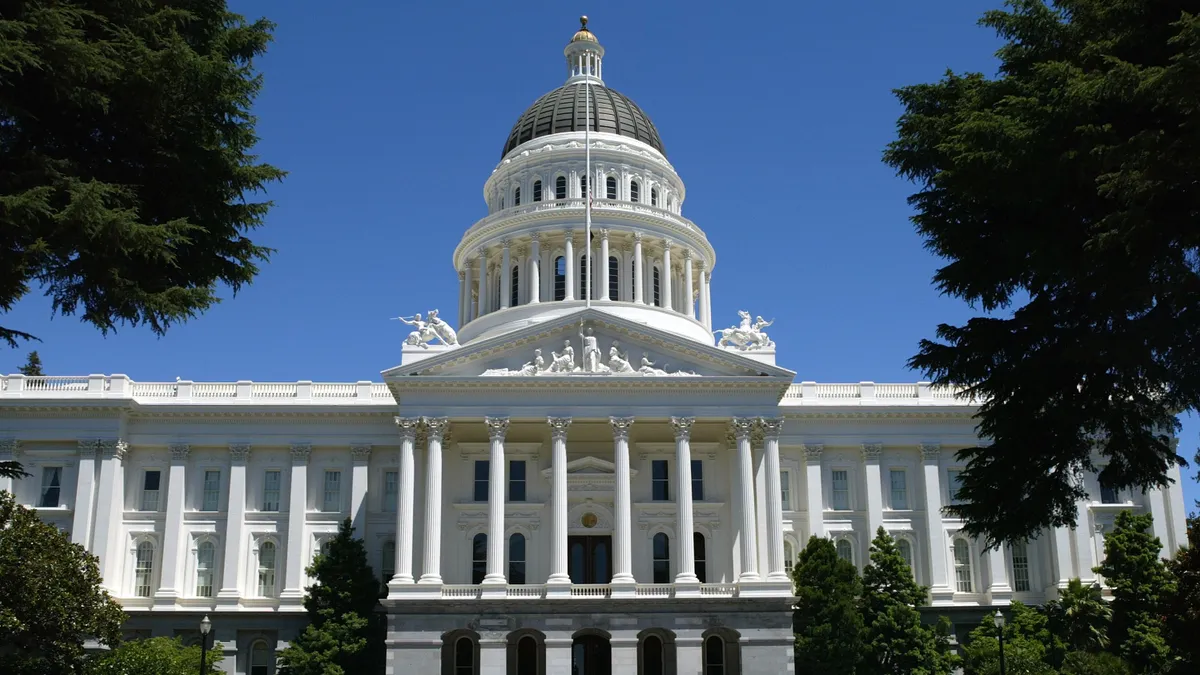California’s legislative session ends on Sept. 14 and lawmakers have been busy trying to clear the remaining hurdles facing their waste and recycling bills.
Some bills didn’t make it past a required Appropriations Committee deadline last Friday and are left on the cutting room floor, but they may be able to return in 2024.
Other bills still have momentum, including a hauler franchise agreement bill opposed by major waste companies, as well as a right-to-repair bill that recently won notable support from Apple. A bottle bill expansion is also still in the mix.
Here’s a look at what’s still in play in the final weeks of the session:
Bills still in the running
These bills have passed the Senate and any required appropriations deadlines. They are now being considered in the Assembly.
-
SB 244: Right-to-repair. The bill would require manufacturers of consumer electronics and some appliances to provide replacement parts, diagnostic information and service manuals to consumers and third-party repair businesses. It would also impose fines on manufacturers that don’t comply. Californians Against Waste, CalPIRG and iFixIt co-sponsor the bill. Right-to-repair is gaining traction around the country, and supporters in California hope that recent high-profile support from Apple, a company that has historically opposed such legislation, could further help get this bill signed into law. “I’d argue it’s the strongest [right-to-repair bill] of any state, and it’s also incredibly symbolic because the Silicon Valley is in California,” said Nick Lapis, CAW’s director of advocacy, in an email.
-
SB 353: Bottle bill expansion and recycling center payment adjustment. The bill would expand the state’s bottle bill to any size juice containers starting Jan. 1. The Container Recycling Institute estimates such an update could add another 188 million containers to the program and help raise deposit return rates. The bill would also update the payment formula that funds recycling centers, a move meant to prevent more recycling centers from closing, especially during times when scrap prices are particularly volatile. As of this week, the bill had no recorded opposition, according to a Senate bill analysis summary.
-
SB 751: Hauler franchise agreements and labor disputes. The bill would prohibit a city or county from entering into or updating a solid waste hauling agreement if a labor dispute would excuse the hauler from carrying out its duties. The hauler would need to provide advance notice of any service disruptions, and it would have to provide customers with refunds or credits. Haulers also would have to allow customers to file a complaint if they do not receive services. This would take effect Jan. 1. WM, Waste Connections and three state trade groups oppose the bill, saying it does not provide enough flexibility and could raise costs both for local agencies and for customers. Supporters like the California League of Cities say the bill would help protect municipalities from liability.
Two-year bills
These bills won’t be voted on this year, but they will carry over into the session that starts in 2024.
- SB 707: EPR for textiles. The bill would require producers of apparel, and some other textile products, to establish a stewardship program. The California Product Stewardship Council, the main sponsor, initially said textile waste is too big an issue to wait for a second year of legislative debate, but ultimately the bill carried over into next year to perfect final bill language. The bill also enjoyed significant support from Republic Services, National Stewardship Action Council, Californians Against Waste and a coalition of environmental groups. “It’s going to be a very active year for EPR next year,” said Joanne Brasch, CPSC’s special projects manager.
- AB 2: EPR for solar panels. The bill would create an extended producer responsibility program for solar photovoltaic panels sold in the state, with companies required to submit plans starting July 1, 2026. The CPSC-sponsored bill, now a two-year bill, saw numerous changes, the latest of which would have added consumer panels to the state-run e-waste law. CPSC says it’s working with stakeholders to further update the bill language.
Shelved for 2023, but a chance to return
Stakeholders say that even though these bills didn’t make it to the finish line, it’s possible that some version will be reintroduced next year.
- AB 1705: Moratorium on incinerators. The bill would have put a moratorium on building or expanding incinerators until certain recycling and organic waste goals have been met for three years.
- SB 615: EPR for EV batteries. The bill called for a manufacturer-funded collection, recycling and tracking system for electric vehicle batteries. The bill had support from several recycling organizations and battery recyclers, like Redwood Materials, but some say the stakeholder process needed more time.
- AB 1290: Eliminating “problematic plastics.” This bill would have aimed to prohibit the use of what bill sponsors said are “problematic” plastics that could contaminate recycling or could cause health problems. It listed PVC, polyvinylidene chloride, polyethylene terephthalate glycol, pigmented PET packaging, plus some products with added PFAS, carbon black, or oxo-degradable additives. Though this bill fizzled earlier in the summer, groups like CAW think it could come back in some form next year.















